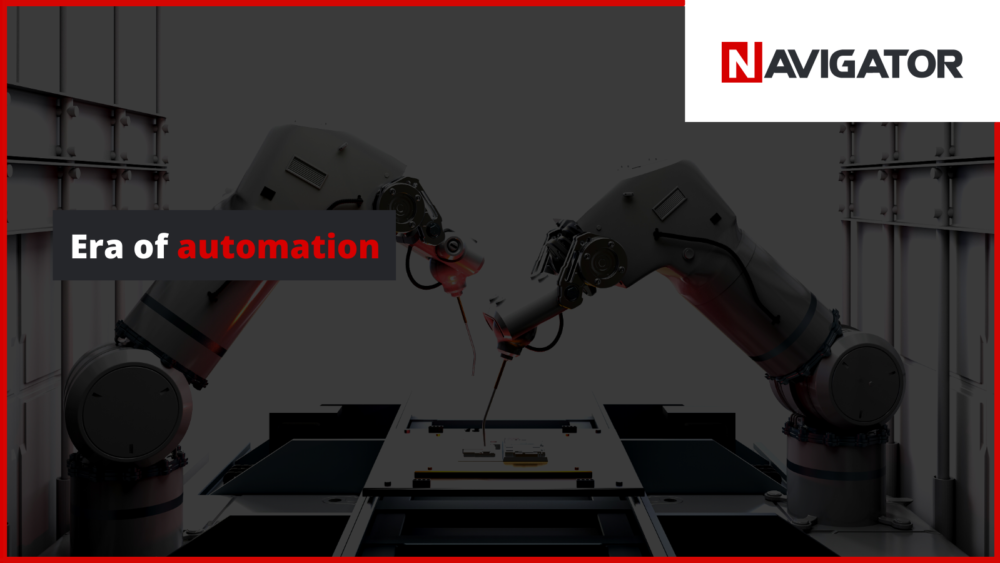It’s constantly getting harder to catch the world that’s running from us. One technological trend is being followed by the next one and the competition never stays passively. It is worth spending some time and deep down into ways of benefiting from those trends, before it’s too late. One of the most crucial ones is without a doubt business process automation. It is not just a convenient tool for multi billion companies, but a very useful solution for almost every type of business. Even Gartner in his famous list of key technological trends, for the 4th time in a row puts automatisation as an impactful development field, which every company wanting to stay on the market should keep an eye on.
According to PwC, by the end of the 2020s around 26% of jobs would be replaced due to automation. Whereas by mid 2030s it would by around 38%*.
Those are the facts. The era of automation is coming. Even today a computer is able to perform plenty of tasks more effectively than a physical worker and by machine learning it is able to handle more and more branches. But what are some of the actual benefits of automatisation in a company?

The automation possibilities in business
The list of processes that can be done by automation is long and ever growing. Every repetitive task such as sale registration, invoice workflow or registrations of any kind can be partially done by machine. The usage of this solution can be found only in sales, but also in medicine, services, technology or logistics.
It is hard to believe that there are still companies that are not benefiting from informational tools allowing process automation. Often for a price of one employee we can significantly reduce costs and time of work. This translates to more effective work in general and in person, since our employee doesn’t have to participate in boring tasks or wait for a response. Work automation also helps to reduce one of the biggest fears, which are human errors in any form, almost to nothing. You don’t have to worry that the job will not be done or would have to be corrected later on. Those situations happen but are rather deviations from the rule. Actions are standarized. Every employee knows what he needs to do. Even when problems happen on the way, thanks to the built-in notifications system, he can pass that information towards the person responsible.
Preparing the company for automation
The first action should always be an analysis and measuring of the processes. There is no way of overestimating the importance of defining the necessary steps and segments that need to be automated. It is recommended to write them down and decide which ones need full automation, which partial and which doesn’t need automation at all.
Knowing our requirements it would be easier to choose the right platform. The decision is not that simple, because there are many different services. When making the choice, it is worth focusing on systems securities, accordance with the law, functionalities and the price per user.
The next step is planning the automation strategy and the implementation process in the company. Our main goal is creating a fair responsibility balance between operational departments and IT. Only then we can build a structure that would allow every single employee to profit from the system on their own.
Division of roles between operational departments and IT
Division of roles is an individual topic. It all depends on both the system with all processes and the personnel competencies. It is crucial however to organize processes regarding opinions of every party participating in it. The business automation systems are designed as simple as possible. Their role is to be easy to understand for every employee in a short period of time.
How to create an automation strategy in a company?
We already know all the processes that we want to automate. What we need to do now is plan out all of them in time that way, so we can gradually automate more complex workflows. Don’t make the mistake of trying to implement every functionality at once. We need to prepare for months of implementation and actualization of current processes to get rid of any imperfections. Don’t forget to decide how do you want to measure process business automation effects.
When the implementation starts and all the artificial intelligence algorithms take over first tasks, we have to remember about taking care of our employees that are worried about their jobs. That’s why it is essential to take actions that inform them about the situation and to create a way for them for development opportunities.
The building of the competencies related to automation
Business automation is related to work culture changes. Often many tasks that have been done one way for years are being shifted, what can cause problems. Employees need to be educated about system functionalities and benefits. Only by believing in the platform’s worth we can fully profit from the automation. That’s why at all costs we should avoid doing tasks the old way or by using different systems for functionalities that can be done on our platform.
Patience is the key. The company automation is a process in itself. Everybody should be prepared that the implementation will take a long time and will need constant supervision to improve its algorithms.
Get to know more about Electronic Workflow, AI, Business Intelligence and No-code applications in NAVIGATOR system
The doubts and worried concerning automation in company
The most popular fear related to automation is a reduction of workplaces. The concerns caused by potential firing are real and can result in negative morale amongst employees. The worker that is not sure of his position will be less effective and may even resign from the company for a more secure position.
Many voices talk about high costs of implementation and system maintenance. It isn’t always the case, because automation platforms can be found on almost every price shelf.
Another thing that raises many doubts is security and being vulnerable for hack attacks. Every one of us have heard about data leaks or downtimes even in the most secure organizations. However that fact shouldn’t be stopping us. The automatisation platforms are often equipped with security certificates (ex. ISO 270001) and are under constant IT supervision.
* https://www.pwc.co.uk/services/economics/insights/the-impact-of-automation-on-jobs.html
Marketing Intern, especially interested in SEO and SEM.
Right now is beggining to write his master's thesis in Informational Management at Jagiellonian University. Michał loves playing billiards, board games and is a huge e-sports fan.





